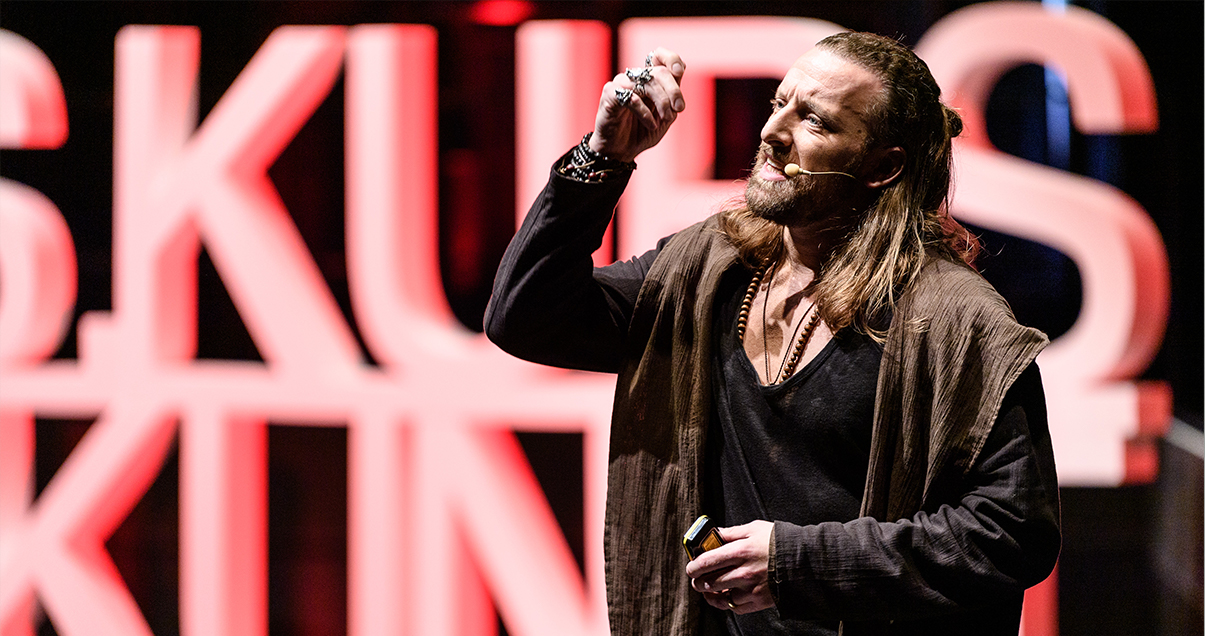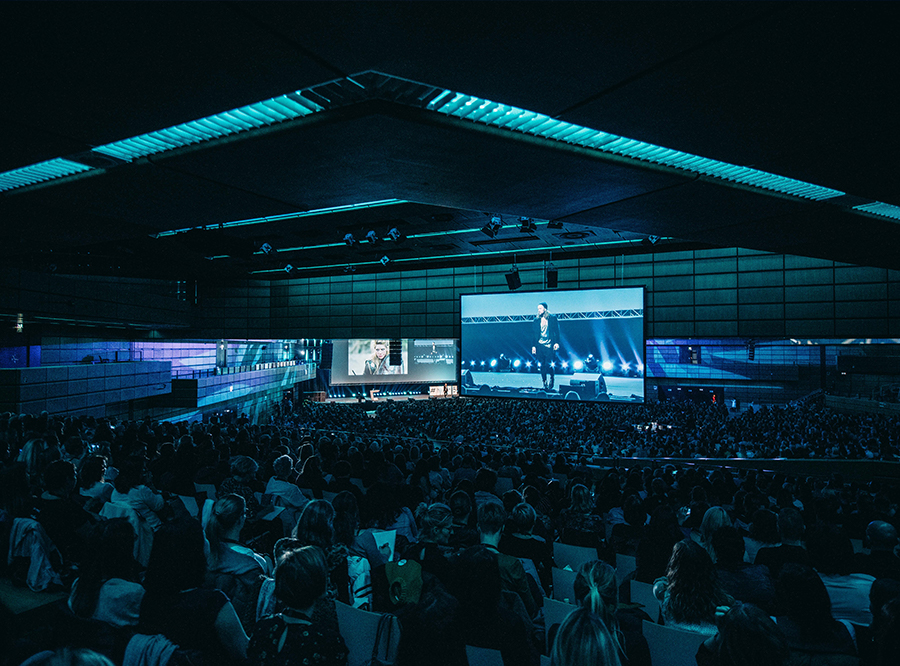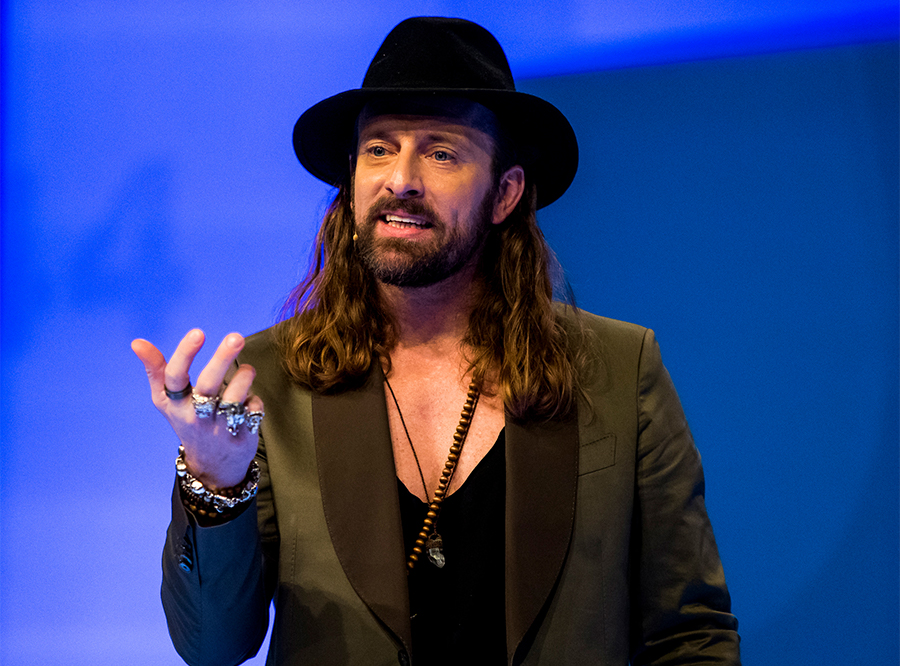The Quantum Philosopher

Anders Indset is an entrepreneur, publicist and is in demand above all as an economic philosopher. The native Norwegian is a sought-after public speaker and he is called on to advise international business executives. In his latest book “The Quantum Economy – What Comes After “Digital”?” he paints a picture of a future economy with a “new operating system for a humanistic world.” The coronavirus pandemic provided him with inspiration for a future title “The Infected Mind,” which he is currently still working on. The unconventional thinking of the 41-year-old, who the media has dubbed a “rock ‘n’ roll Plato,” comes across not only in his arguments but also in his interview with Sonnenallee, as he prefers to be addressed informally
Sonnenallee: One of your arguments is that in our digitalized world humans are making themselves obsolete as a species, homo obsoletus. What brings you to the conclusion that humans are making themselves obsolete?
Anders Indset: Lots of people don’t think for themselves anymore. They are driven and programmed by stimuli. They are overwhelmed by the mass of information so they allow online search engines to narrow down their choices, enabling themselves to be managed by recommendation algorithms and thereby becoming prisoners of their own freedom. They feel as though they constantly have to deliver and perform. I liken it to a form of self-exploitation. But what humans are increasingly lacking is their own initiative, independent thinking and personal positive ideals.
So your plea is for us to slow down. Do you think that the current pandemic is forcing people to slow down?
AI: I’m not seeing any signs of that at the moment. I don’t believe that the current coronavirus pandemic is a relevant factor in inspiring change as such. But it may have the potential to accelerate the underlying forces of change. I get the impression at the moment that things that used to take ten years are now becoming possible within ten months. So I think we are speeding up rather than slowing down. Anyway, only genuine crises can inspire true upheaval.
You don’t class the current situation as a genuine crisis?
AI: It may well seem like a crisis for a decadent society. But, from my perspective, it isn’t a real crisis. Real crises are more threatening to our very existence. They are a matter of life, of survival. Obviously we’re going through some tough times at the moment and people are extremely worried. It’s just that, in my eyes, a real crisis looks somewhat different. It entails a lot more pain and anguish. It involves a situation like we had after the Second World War in Europe.
So what do you consider to be the bigger issue at the moment?
AI: The issue is less that coronavirus is infecting us, but rather that our thinking was already infected before coronavirus. We respond to tweets and headlines in a purely superficial way nowadays. We come upon absolutes and ideologies that we don’t even understand anymore. But it is in times of chaos, in particular, that people look for simple solutions and stable structures, and that’s a dangerous thing. This leads to reactionism. But we have to question our old self-evident truths in order to come to an understanding of the world, to understand a complex world by learning to comprehend the interdependencies.
How do we do that? Where, specifically, would you start?
AI: More than ever, social media are telling us that we need to be against something. But what we really need is a lot more fresh inspiration, ideas and solutions. I don’t think that the problem can be resolved by politics. Politics is mainly about preservation and administration and less about creation. What we need to do is heal our thinking, and this can only be achieved through education. Our learning is geared toward passing a final exam or getting a good grade. This thinking is completely outdated. In this day and age, our computational skills are already completely inferior to technology. So we need to think in the blanks that artificial intelligence cannot fill. Instead, we need to teach young people the ability to learn and think independently. Today, it’s all about the interaction between man and machine and the future of organized human life. We need people with the capacity to be creative, today and tomorrow. People who understand people. That is a rather practical philosophy.


The world of work is undergoing a process of digital transformation. What do you think the fundamentally important aspects are and how should your coined term of a quantum economy be understood in this context?
AI: The first thing we need is digital enlightenment to produce a kind of renaissance. In our economic thinking, we ignore disciplines like philosophy, psychology and art. Some people even claim that philosophy is an old-fashioned discipline that can no longer provide answers to modern-day questions. I believe that the opposite is true. The only way for us to build a quantum economy and an enlightened society is to take a holistic approach – and that requires not just rationality and logic, but social and emotional intelligence as well. Not just an IQ, but also a “WeQ.” Humanism and humanity should not be left by the wayside as we rethink our economy.
What role do renewable energies play in the quantum economy?
AI: We’re not going to turn back the clock; energy is more important than ever in this digital age. But what isn’t going to help us whatsoever is to engage in eco-hysteria. That’s why I’m always talking about an eco-utopia as a positive ideal. In a new economy, we certainly won’t stop flying, but we can do it in a more environmentally friendly way. We shouldn’t keep using old technologies. But investment in new technologies will inevitably result in ecological collapse. The understanding of this is often not given enough attention in public debates.
In your book, you talk about the fact that we need action heroes. What nuggets of wisdom are you currently imparting to executives at your seminars to help them become action heroes?
AI: For executives, it is becoming clearer now more than ever that it’s not management but leadership that is key. My message to them is: It’s up to you to decide how to apply your principles and what course of action to take, and how these things influence you and others. Lead the way as a role model and creative thinker, respect the people around you, adopt your own style, and clearly express what you stand for and what you love. Become an agent of change – even if it only affects your own reality.
Have you applied your principles to yourself as well? What important decisions have you made in your life? Is there one that stands out?
AI: For me, it was a rather gradual transformation from a turbo capitalist who experienced the highs and lows of entrepreneurship into the man I am today. Earning more money alone didn’t enrich my life. It’s a process of learning to let go and setting out what is right and what is important for you personally. It’s a pleasure and a privilege for me to get up every day and do something that fulfils me.
What has been your personal experience of 2020?
AI: I’ve not been able to give anywhere near as many talks, I’ve been to fewer events. I’m missing human interaction in particular. But I’m in a very privileged position and have been able to enjoy this time and use it to work on my own personal development. I’ve read a lot and I’m now turning all this input into output. I’ve started to write my new book “The Infected Mind”.
So does that mean we’ll soon get to read a new book from the “rock ‘n’ roll Plato”? How do you feel about this nickname?
AI: The media comes up with these names. I understand why and take it on board, but it bears no relevance to the content of my work.

